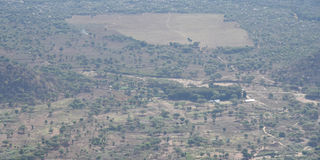Sh300m irrigation project in ruins, thanks to Kerio Valley bandits

A vantage view of the 2,000-acre Kabonon-Kapkamak irrigation scheme in Kerio Valley, Elgeyo Marakwet County on January 20, 2022, which has become a death trap. Frequent cases of insecurity have affected farming and economic activities in the area.
Thousands of residents of Arror ward in Elgeyo Marakwet County are staring at starvation after being forced to abandon farming in the 2,000-acre Kabonon-Kapkamak irrigation scheme that directly benefited over 3,000 families.
The only remaining irrigation farm in the Kerio Valley region after several others were abandoned due to security has also been deserted after bandits turned it into a battlefield.
Bandits from a neighbouring county are reportedly hiding in the nearby Kobot hills and shoot daily at anyone who dares to walk onto the farm.
Chepkum, Kapsawach, Kamsiwet and Tot-Kolowa are among several multimillion-shilling irrigation schemes that have been abandoned due to perennial insecurity.
Critical scheme now a death trap
The Sh300 million project funded by the African Development Bank and the government of Kenya was a crucial scheme because it provided food security and created employment for hundreds of people who were engaged in contractual farming.
Mr Leonard Yano, a farmer, said the scheme had transformed the lives of small-scale farmers who were hitherto food-insecure and impoverished.
Locals now call it a death trap.
“None of the 3,000 farmers have planted any crop in the scheme because the bandits are determined to see the parcel of land remain deserted by shooting at anyone who dares to go there. We do not know what their aim is and the government should intervene,” said Mr Yano.
Shooting started last month
The shooting, he said, started almost a month ago and bandits fire thousands of bullets daily at locals and motorists on the Arror-Biretwo road.
The farmer said they usually grow sorghum, beans, green grams, tomatoes, maize, vegetables, groundnuts, watermelon and cassava.
“There are farmers who have been contracted by Kenya Breweries Limited to grow sorghum. Others are engaged by Simlaw Seed Company for seed bulking as well as Egerton University,” he said.
“The farmers usually derive their income from the sale of the produce, but are now staring at huge losses because of the insecurity.”

Baringo North MP William Cheptumo (in black cap) when he toured Kobot village, Kerio Valley on May 8, 2022 to condole with a family whose kin, a primary school teacher was killed in a banditry attack recently.
Ms Selina Kanda, another farmer, said that a week ago, local administrators from Elgeyo Marakwet and Baringo counties held a meeting in the area, promising to flush out the bandits, but nothing had been done since.
“Koitilial and Kapkata trading centres remain deserted after locals fled because it is within the reach of the bullets. Fortunately, no one has been injured. But how will we get food to feed our families and money to pay our bills, because the scheme was our economic lifeline?” she lamented.
“The government should act as it promised and flush out the bandits to allow us to till our lands. The safety of our learners in schools is also at risk.”
Communities blamed
Elgeyo Marakwet County Commissioner John Korir said the matter was being addressed, blaming the two communities for engaging in a vicious cycle of violence.
"It is sad multiple projects are in ruins because of insecurity. We have stepped up community engagements on the need for peaceful coexistence. The problem is among all the communities in Kerio Valley who launch attacks and the other retaliates," he said.





